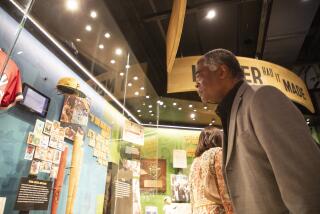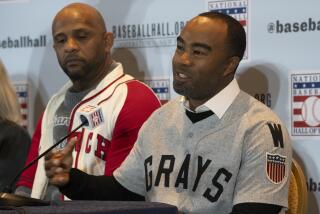Orioles’ Exhibition Game in Havana Sparks Political and Athletic Debate
- Share via
HAVANA — The half- crazed band of boosters with painted faces, cowbells and ancient trombones belted out the rhythm from the lower deck, while five cheerleaders in black Lycra cocktail dresses and 8-inch heels did a wild guaguanco dance atop the first-base dugout.
Air horns powered by rusty Russian compressors split the air. Vendors peddled coffee in thimble-sized paper cups. And with each strike, ball, hit or out, the stadium erupted in deafening rounds of emotion, while a towering right-field billboard proclaimed: Cuba’s Socialist Sport.
Welcome to Game 7 of last week’s Cuban national baseball league semifinals at Latin American Stadium, where grandstand admission is 10 cents, the highest-paid player makes about $40 a month, most fans arrive on bicycle or foot--and where, 40 years ago, Sandy Koufax was the last American major league starter on the mound.
Until today.
A rare experiment in “political baseball” will begin in this Communist capital when the Baltimore Orioles take on some of Cuba’s best players in a nine-inning contest that most in this baseball-crazed town view as much more than a game.
Reminiscent of the Beijing Ping-Pong matches that broke through the Bamboo Curtain in the 1970s, today’s exhibition game marks the first time an American major league baseball team has played in this U.S.-embargoed nation since Koufax led the Dodgers to a 4-3 spring-training victory over the Cincinnati Reds in this same stadium. That was March 21, 1959, just 11 weeks after Fidel Castro and his revolution had taken power and changed the course of Cuba and its favorite sport.
The differences between then and now in this 53-year-old stadium reflect the ocean of mistrust and misunderstanding that lies between two Cold War-era enemies only 90 miles apart.
Today there will be no “pistol-packin’ rebels in the stadium,” as Times sportswriter Frank Finch observed at the 1959 game. Attendance will be by invitation only.
The game will be shown live in Cuba, as well as in the U.S. via ESPN, but long gone are the 38 Cuban radio stations, 12 newspapers and five TV networks that covered the last American major league game in what was then called Gran Stadium. Today there are only two television stations and one daily newspaper here, all run by the Communist Party. And none had even made mention of the Orioles-Cuba game until Friday, when a one-paragraph announcement of the game appeared in a sports story.
But the lack of publicity belies the enormous significance of today’s contest--both in Washington and here, and especially to millions of Cuban baseball fans who have debated it in the streets for weeks in a land where the sport is synonymous with nationhood and life itself.
The game, billed by the Clinton administration as an important cornerstone of its tentative new “people-to-people exchange” policy toward Cuba, climaxes years of negotiations between the Orioles’ ownership, major league baseball and both governments.
To make the trip, Oriole players, coaches, managers and staff needed visas from Cuba and official licenses from the U.S. government, which effectively bans American citizens from traveling to Cuba under a nearly four-decade-old embargo aimed at isolating Castro’s regime and driving it from power.
The ubiquitous 72-year-old Castro, who was known for his fine curveball during his younger years, has nurtured baseball as a singular source of Cuban nationalism, socialism, populism and international recognition during his decades as leader. Cuban victories over U.S. teams in international competitions have been hailed here as major triumphs over a superpower enemy.
There has been no official explanation for the absence of publicity for an event many Cubans equate with last year’s historic visit to the island nation by Pope John Paul II, although several Cubans speculated it could be linked to new laws here that appear to restrict Cubans’ contacts with Americans.
In their first public statement on the game, Cuban officials on Thursday said only that admittance to the 50,000-seat stadium will be closed to Cuba’s general public. Invitees, they said, will include workers, students and members of other official organizations, handpicked by their leaders. It was unclear if Castro will attend.
Adding to the mystery, the roster of the Cuban team was a closely held secret at week’s end. It most likely will not be the same Cuban national team that has competed--and won--many international tournaments in recent years; Cuban officials referred to their team as “a selection of Cuban players.”
Further complicating the game’s logistics, it comes amid the equivalent of Cuba’s World Series: The first two games of the seven-game final between Santiago de Cuba and Havana’s Industriales were held Friday night and Saturday. And officials here said stars from those teams--among them internationally acclaimed third baseman Orestes Kindelan--will not play today.
Also missing from the roster will be two of Cuba’s most famous stars--Florida Marlin pitcher Livan Hernandez and his half-brother, Orlando “El Duque” Hernandez of the New York Yankees, whose defections to the U.S. in recent years led an enraged Castro to label them “sports mercenaries.”
But today’s game is sure to feature such legendary Cubans as slugger Omar “El Nino” Linares, who in 16 seasons with the national baseball league has a .371 batting average, 377 home runs and 1,094 runs batted in.
The lack of publicity has served only to encourage and intensify the grass-roots debate among Cuban baseball zealots over not merely who will represent them but also the significance of the game.
In a nation where public opposition to the regime is illegal, today’s game has offered a forum for Cubans to vent emotion and argue out the more critical issues of the day.
Forget capitalism vs. communism. What about wood vs. aluminum?
“This is the most critical thing,” shouted Julio Cesar, a 30-year-old jewelry maker, over the roar of Latin American Stadium last week. He was seated in the bleachers just above the 380-foot mark in left field, where he and his friends have gathered for years.
“Until last week, Cuban players have been using aluminum bats. They’re not used to the wood bats, so this definitely gives the Orioles the advantage.”
Cuba switched to aluminum 22 years ago, along with most other Caribbean and Latin American countries. Aluminum bats break less often, reducing expenses for a socialist nation like Cuba, where all players are amateurs employed by the state.
But the switch led to another problem: Aluminum bats drive regulation baseballs farther. So Cuba designed a deadened ball that had been used up until Friday night’s opening of the final series. A regulation ball will be used in the Orioles game today.
“Two years ago, everyone was hitting home runs here,” explained Ismael Sene, a retired Cuban diplomat who considers himself among Havana’s most rabid baseball fans. “I remember one game between Sancti Espiritu and Villa Clara: They hit 18 or 19 home runs and something like 50 or 60 hits.”
Sene and other enthusiasts here added that, although they hope their team wins today, it faces other clear disadvantages in the contest.
“I think the Orioles are better than the Cuban team,” said Cesar, the jewelry maker, adding that he won’t be able to attend the game because he works in Cuba’s nascent private sector.
“I want Cuba to win and in baseball anything can happen. But we must be realistic.”
Pedro Chavez agreed. He is among Cuba’s living baseball legends, a star outfielder in the 1960s and former coach of Cuba’s national team and its youth team. During an interview in his modest Havana home last week, Chavez said, “I think our baseball is good. But a professional is not the same as an amateur. The teams are not equal.
“But it’s still going to be a beautiful occasion.”
Unlike most Cubans interviewed in the streets of a nation where baseball and politics often seem inseparable, Chavez said he saw no political importance in the game’s outcome.
And for Chavez, that’s saying a lot. He single-handedly gave the Cuban government a major triumph during the 1963 Pan American Games in Sao Paulo, Brazil. He hit two grand slams in the final game against the U.S. team, leading Cuba to a 13-1 victory that its state-run press proclaimed the next day had proved “Cuba reconquers supremacy in world baseball.”
“I’m not a politician. I know nothing about politics,” said Chavez, 62. “But I do believe today’s game is extremely important. Because the relations between the two countries can improve greatly and we can play more in the United States. This is a policy we’ve been very late in getting to, on both sides.”
The Orioles will, in fact, reciprocate for today’s game on May 3 when they host the Cuban team for an exhibition game in Baltimore’s Camden Yards. Whether other games follow or the event leads to more cooperation in other fields between the nations, as the Clinton administration has said it will encourage, none of the fans interviewed at Latin American Stadium last week cared to speculate.
“I don’t think about politics or policy. I just want to be a sportswriter,” said Carlos Morales, a 20-year-old University of Havana journalism student.
“But I do think this game is going to be very significant. Finally, it’s going to break this barrier that has been up so, so long. We want to see what baseball is really like in the major leagues.
“I see it as a test. You say you’re better than us. We say we’re better than you. Come Sunday, let’s see.”
(BEGIN TEXT OF INFOBOX / INFOGRAPHIC)
Today
* Who: Baltimore Orioles vs. Cuban national team.
* Historic game: Cuba hasn’t hosted a major league game in 40 years.
* TV: ESPN,
8:45 a.m.
More to Read
Go beyond the scoreboard
Get the latest on L.A.'s teams in the daily Sports Report newsletter.
You may occasionally receive promotional content from the Los Angeles Times.










